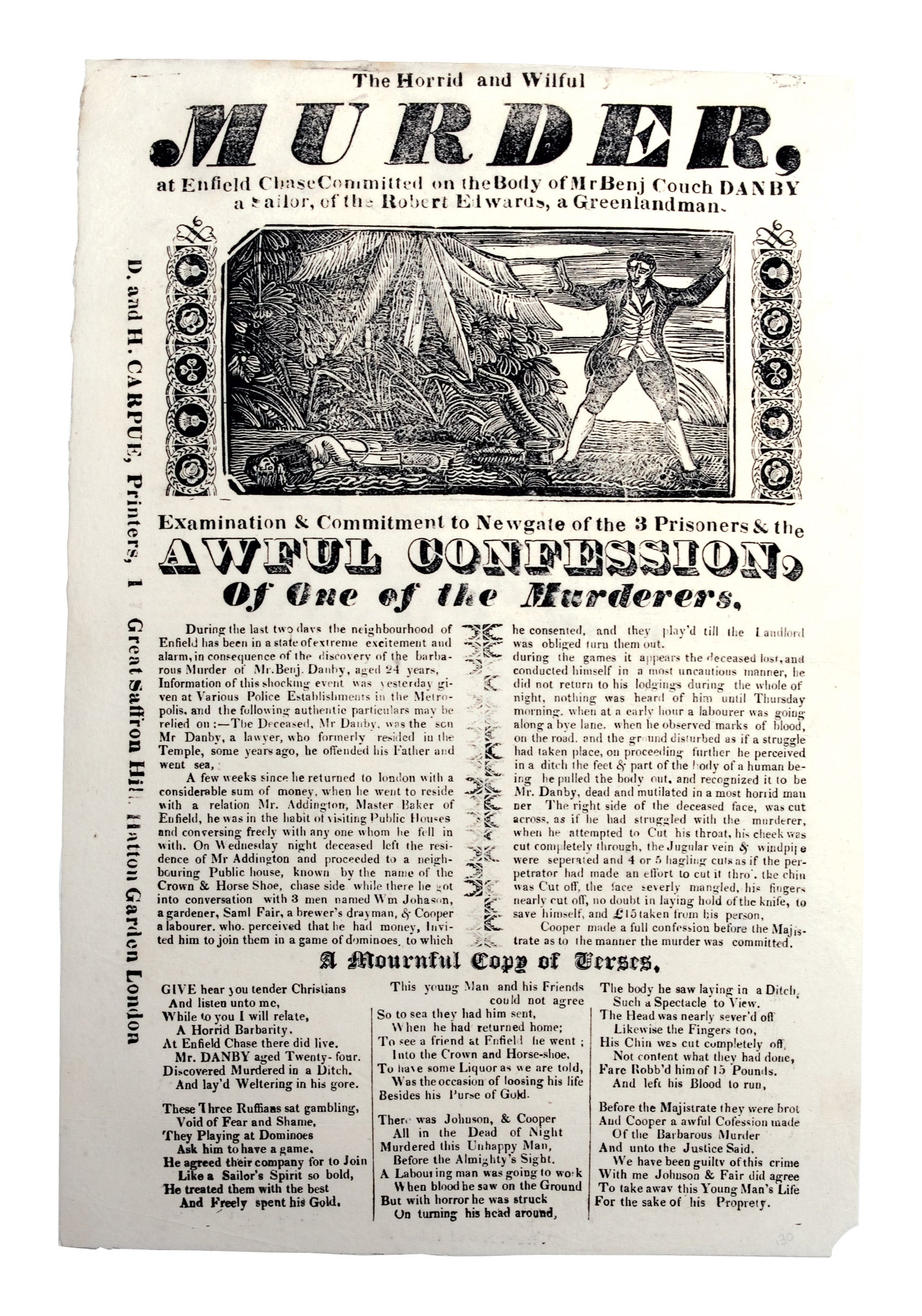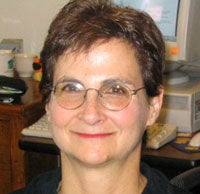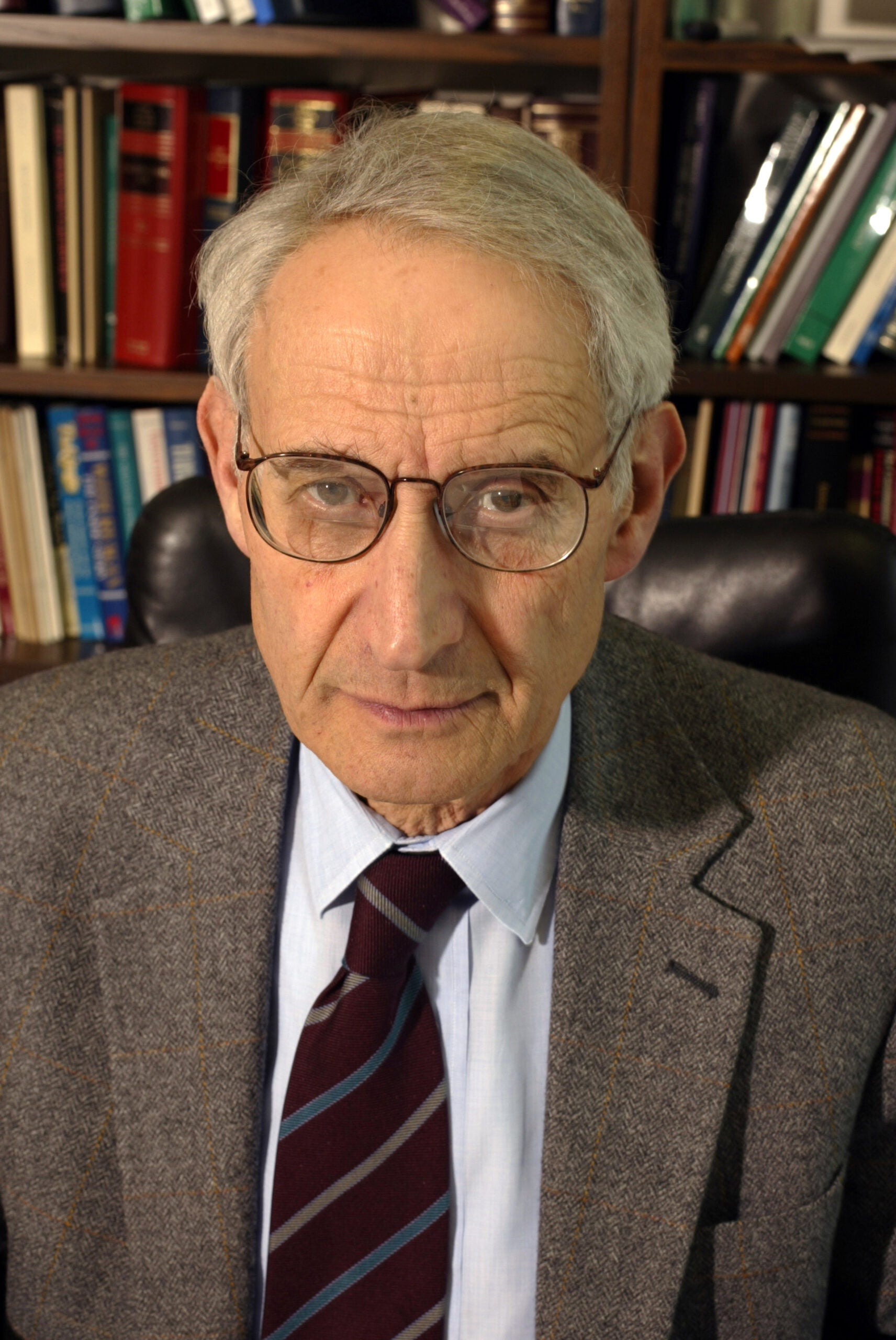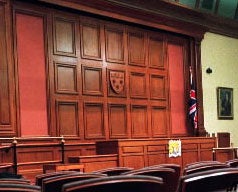Archive
Today Posts
-
Crime Pays
July 1, 2005
For 19th century printers, crime was good business. Brutal murders and other horrific crimes translated into profit when they became the subjects of single-page printings. Today close to 400 of these broadsides, most printed in England from 1820 to 1860, are preserved in an HLS library collection. They highlight acts of wrongdoing, purported confessions from the accused (often set in verse), and accounts of trials and public executions. Many are illustrated with woodcuts.
-
Students contribute to prominent human rights reports
June 27, 2005
Two new human rights reports from international groups Human Rights Watch and Front Line draw on research and writing from students in the Clinical Advocacy Project of Harvard Law School's Human Rights Program.
-
Harvard Law School's historic Langdell South classroom has been renamed Kirkland and Ellis Hall in recognition of a $3 million gift made by the Chicago-based international law firm. The gift will support preservation and upkeep of this important 162-seat teaching space and -- as part of the Harvard Law School endowment -- support the law school's general educational and research activities.
-
Harvard Law School's Berkman Center for Internet and Society -- the first research center for cyberlaw -- and the Oxford Internet Institute -- the world’s first multidisciplinary Internet research center -- today announced a new research and teaching collaboration.
-
Global finance experts discuss U.S.-China relationship
June 17, 2005
This weekend, leaders of the financial systems of the United States and China will gather in Armonk, New York to examine issues affecting the financial relationship between the two countries.
-
Last week the Ninth Circuit Court of Appeals ruled that a family is a protected and recognized social group for purposes of refugee protection and asylum eligibility—a ruling praised a group of Harvard Law School students. The students, working with the Harvard Immigration and Refugee Clinic and the Harvard Human Rights Program, had filed an amicus brief in the case of Thomas v. Gonzales urging the court to reach the conclusion reflected in the ruling.
-
On Thursday, June 16, Harvard Law School will host a celebration in honor of the 50th anniversary of the South African Freedom Charter. The Charter, adopted in 1955 by the African National Congress and its allies, set out principles regarding equality and respect for human rights for South Africa.
-
New York State Attorney General Eliot Spitzer told an HLS Class Day audience today that self-regulation by corporations and financial institutions has been an “abject failure” and he warned graduating 3Ls not to succumb to hubris or the delusion that they are “Masters of the Universe.”
-
Martha Minow wins Sacks-Freund Teaching Award
June 8, 2005
Professor Martha Minow is the winner of the prestigious Sacks-Freund Teaching Award, an honor bestowed each year on a member of the Harvard Law School faculty by the graduating class. Presented at Class Day--the day before commencement--the Sacks-Freund award recognizes teaching ability, attentiveness to student concerns, and general contributions to student life at the law school.
-
The American Law and Economics Association recently named Professor Steven Shavell as co-editor of the association's official journal, the American Law and Economics Review. Shavell will assume the co-editorship position from Judge Richard Posner.
-
The following op-ed by Professor Charles Fried appeared in The Boston Globe on Thursday, May 19, 2005: The Republican leadership may change Senate procedures so that a minority of 41 of the 100 senators could no longer permanently block a floor vote for judicial nominees. This is really a political, not a constitutional fight, and in figuring which side to support, the public should at least not be confused by bogus claims of constitutional principle.
-
Harvard Law School's Federalist Society and American Constitution Society will join forces next fall to host provocative, off-the-record moot court sessions previewing Supreme Court cases. The Supreme Court Advocacy Project, sponsored by the two organizations and Dean Elena Kagan, will invite litigants of upcoming cases to present their arguments before a panel of experts, discuss case strategy and receive critiques.
-
In November 2003, at age 33, Jeffrey Fisher appeared twice before the Supreme Court. After finishing arguments for one criminal law case -- a field which was not his specialty -- he returned to the Court 15 days later to argue a second criminal case. Even more remarkably, he won both. A partner at Davis Wright Tremaine LLP in Seattle, Wash., Fisher was chosen by the 2005 Class Marshals as this year's Class Day speaker. The address will take place on Wednesday, June 8 at 2 p.m.
-
Commencement schedule announced
May 10, 2005
On Thursday, June 9, the Harvard Law School Class of 2005 will graduate in ceremonies at HLS and at the University. Details about the occasion, and Class Day on Wednesday, June 8, are now available on the Commencement 2005 website.
-
This year's list of 10 Best Corporate and Securities articles includes four selections from Harvard Law faculty: Professors Lucian Bebchuk, Mark Roe and Guhan Subramanian, who authored of two articles on the list. The list was chosen by corporate and securities law faculty from 430 selections and will be announced in an upcoming issue of the legal journal, "Corporate Practice Commentator."
-
In the past two decades, Boston Harbor has gone from being the nation's most degraded to a symbol of national pride. Where 12 billion gallons of raw or partially treated sewage once flowed in each year, dolphins and seals are now returning, waterfront businesses are thriving, and a state-of-the art sewage treatment plant is whirring away on Deer Island. That turnabout is thanks to, in part, one judge and his special master: Charles Haar, professor at Harvard Law School.
-
Fallon says Constitution is 'underenforced'
April 29, 2005
The following remarks are excerpted from a lecture delivered by Professor Richard Fallon at Harvard Law School in February marking his appointment to the Ralph S. Tyler Jr. Professorship of Constitutional Law. He argues that a recent U.S. Supreme Court case reveals a willingness by the Court to allow a "permissible disparity" between what the Constitution says and the way it is enforced. (From the April 2005 issue of Harvard Law Today.)
-
Bellow Award honors public service of student and alumna
April 27, 2005
On Thursday, April 28, the Gary Bellow Public Service Award will be given to an accomplished student and alumna for their community-focused work. Chi Mgabo, 3L, will receive the student award for her human rights advocacy, and Luz Herrera '99 will receive the alumna award for her legal service for underserved communities in California. The ceremony and reception will take place at 4 p.m. in Austin East.
-
At 4:30 p.m. on Monday, April 25, Assistant Professor Jonathan Zittrain hosts a special version of his class, Cyberlaw, which will be avaible to the public via a webcast. Jimmy Wales, founder of the online encyclopedia Wikipedia, will be the guest speaker, and the webcast of Zittrain's class will offer viewers the chance to participate and contribute questions.
-
Finance experts discuss evolving US-EU market relationship
April 25, 2005
This weekend, leaders of the financial systems from the U.S. and Europe convened in Eltville, Germany to discuss the function and stability of the global financial system. The three-day symposium was organized by Harvard Law School’s Program on International Financial Systems and the Centre for European Policy Studies.
-
Professor Jackson on Social Security: No easy fix
April 22, 2005
Professor Howell Jackson ’82 isn’t afraid to touch what’s long been considered the third rail of American politics: Social Security reform. Jackson, the James S. Reid Jr. Professor of Law, has long taught about regulating financial institutions and pensions, and he’s made Social Security one of his top research interests. He recently spoke with Harvard Law Today about the problems facing the Social Security system and the prospects for fixing them.








